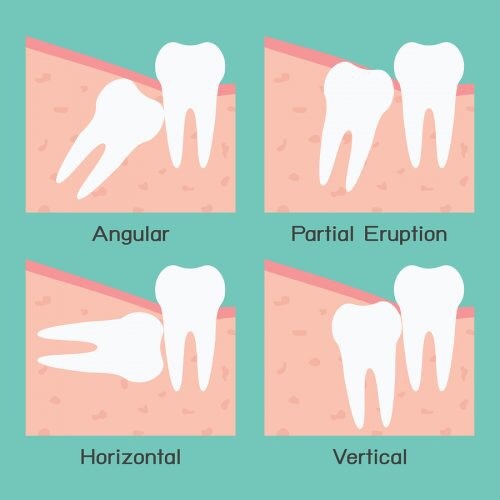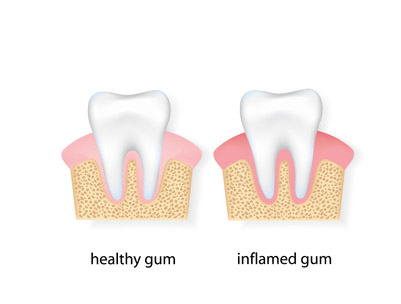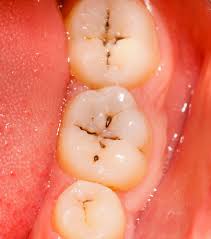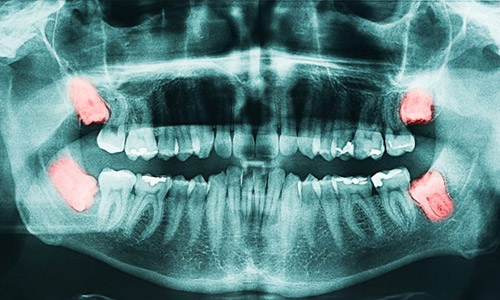The wisdom teeth or the third molars are the last teeth to erupt in the mouth, appearing usually when a person is between 17 and 24 years old. While some people have no problems with their wisdom teeth, there are many who will experience discomfort from these teeth. In many such cases, the removal of the wisdom tooth would necessary to remove the pain as well as return to normal function.

Some people will fail to have their wisdom teeth from developing or have the fortune of them erupting in the right direction. Unfortunately, for many people, at least one of the third molars will grow at an angle, be impacted or both, and this can be a truly aweful experience. So what are the signs that you might need to look out for to know that to have your wisdom tooth removed?
Check out our list below.
1. Bad breath/ Bad taste in the mouth
The gums around the impacted wisdom tooth can trap food particles, which will be difficult to remove or will make daily brushing less effective. As a result, the area becomes a breeding ground for bacteria because of the moist and warm environment in the mouth. The bacterial growth also causes the bad breath as well as a foul taste in the mouth. When this bacterial presence remains unattended for a prolonged period of time, it can lead to serious chronic infections.
2. Constant Pain

3. Difficulty opening the mouth/ Eating becomes difficult
Food may get stuck between the impacted wisdom tooth and the adjacent tooth. This often leads to bacterial growth that may cause some swelling around the back of the jaw. This can become worse over time, as it is usually difficult to clean. In extreme cases, this could lead to a terrible infection in the area. Another cause for the difficulty could be the intense pain from the wisdom tooth that radiates to the skull and surrounding areas. Often, swelling around the jaw makes it difficult to function and eat properly.
4. Teeth misalignment
Some of your teeth, especially those at the front, could grow out of alignment when your third molars start erupting. One reason is that your mouth may not have enough space for your wisdom teeth, and thus, crowding of the other teeth happen. Another reason for the misalignment of the teeth is that the third molar that is growing at an angle pushes the neighbouring teeth against the rest in the set. Teeth misalignment caused by wisdom teeth could happen throughout the years and you’ll probably be surprised later in life you may develop crooked teeth. Thus, it’s important to have a dentist to monitor your wisdom teeth and its effects on your dentition. For many people, they want to extract their impacted wisdom tooth as early as possible before they can cause misalignment to the rest of their teeth.
5. Inflamed Gums

6. Headaches/ Migraines
There are many causes of headaches and migraines, so if you have them while also having impacted wisdom tooth, the dental issue may not be the real reason. For one, you may simply be prone to headaches. Also, when you’re an adolescent, which is the usual age when third molars erupt, your hormones can go awry while your body adapts to development changes, causing headaches. When it comes to wisdom teeth growth, though, the headache is generally caused by your attempts to adjust your bite and jaw to lessen the molar-related pains. The temporomandibular joint (TMJ) or the joint that connects your jaw to the skull gets stressed or dislocated, causing pain to the surrounding muscles. The pain then radiates to the head, face and neck.
7. Swollen jaw/ Swollen glands in the shoulder and neck
Dental infections are among the most common causes of the swelling of the lymph nodes at where the neck meets the jaw, and an impacted wisdom tooth is no exception. Ultimately, the swollen glands will lead to the swelling of the jaw as well as to many annoying conditions such as difficulty in eating and chewing food, and even just opening the mouth. When accompanied with bad smell and pus drainage, it’s important to have your wisdom tooth checked or removed by a dentist. Facial swellings that are left unattended, could land you in the hospital if not managed in a timely manner.
8. Cavities

9. Sinus, fever and sore throat
Sinus pain can be experienced if the roots of the wisdom tooth on the upper arch push against the sinuses directly above the tooth. Headaches, as well as pressure and congestion in the upper jaw area are felt.
While sore throats are generally caused by either virus or bacteria, you can also experience pain on the throat and neck when you have impacted wisdom tooth. The infection (pericoronitis) occurring between the wisdom tooth and the surrounding gums can drain to the lymph node glands on the neck, manifesting as a sore throat.
Fever occurs when there’s an infection in the body. When it comes to wisdom teeth, the fever is often caused by gum diseases or infection.
Conclusion
Many of these symptoms may disappear in several days or weeks, but they can also come back later on in your life when the wisdom tooth starts to push even further. Whenever your wisdom tooth inconveniences you, consider consulting a professional dentist who can help determine if it requires immediate removal or just monitoring for the time being. However, if you’re suffering with most or all of the signs and symptoms enumerated above, it’s imperative that you seek the dentist’s help at once. Don’t hesitate to visit one of our dental clinics across Singapore today!

